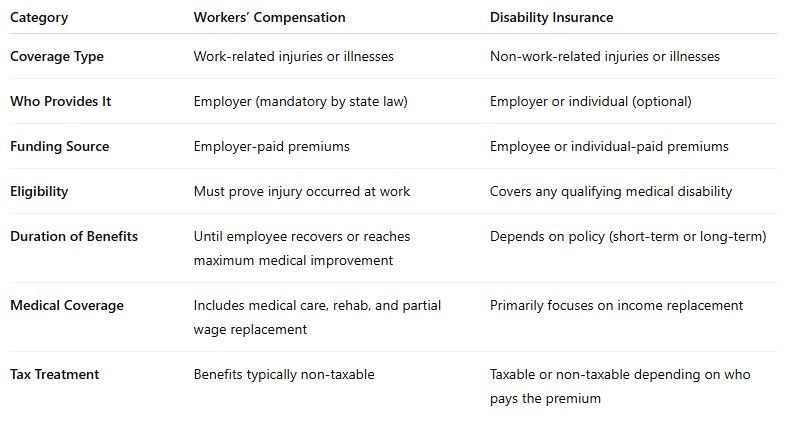
When unexpected injuries or illnesses prevent you from working, having the right coverage in place can make all the difference. Two types of insurance often come up in this conversation—workers’ compensation and disability insurance.
While both provide income protection during recovery, they serve very different purposes. Understanding how these coverages work—and which one applies to your situation—can help you safeguard your health, income, and peace of mind.
This guide explains the key differences between workers’ comp and disability insurance, what each covers, and how they work together to protect your financial stability.
What Is Workers’ Compensation Insurance?
Workers’ compensation insurance is a state-regulated program that provides benefits to employees who suffer work-related injuries or illnesses. It is required by law in most states and helps cover medical expenses, lost wages, and rehabilitation costs resulting from on-the-job incidents.
Key Features of Workers’ Comp:
Coverage Type: Protects against job-related injuries or occupational illnesses.
Who Pays:
Employers are responsible for providing this coverage.
Benefits Include:
- Medical treatment for work-related injuries
- Temporary or permanent disability benefits
- Lost wages during recovery
- Rehabilitation or retraining costs
- Death benefits for dependents if an employee dies from a work-related injury
Example:
If a construction worker in Greenville, SC, injures their back while lifting heavy materials, workers’ compensation would cover their medical treatment, physical therapy, and partial wage replacement while they recover.
What Is Disability Insurance?
Disability insurance, on the other hand, protects your income if you’re unable to work due to non-work-related illnesses or injuries. It’s designed to provide financial support when you can’t earn your usual paycheck, even if your condition didn’t occur on the job.
There are two main types:
1.Short-Term Disability (STD):
- Covers temporary conditions (e.g., surgery recovery, pregnancy, illness)
- Benefits typically last between 3–6 months
- Replaces around 40–70% of your income
2. Long-Term Disability (LTD):
- Covers extended disabilities lasting months or years
- Often kicks in after short-term disability ends
- Can continue until retirement age, depending on the policy
Who Pays?
Disability insurance can be offered through your employer, or you can purchase an individual policy for added protection—especially if you’re self-employed or work as an independent contractor.
Key Differences Between Workers’ Comp and Disability Insurance
Although both provide financial support, they differ in coverage scope, eligibility, and purpose.

When You Might Need Both
Many people benefit from having both types of coverage, since each protects you in different situations.
- Workers’ comp only applies if your injury or illness is work-related.
- Disability insurance covers everything else—like car accidents, chronic illnesses, or surgeries unrelated to work.
For example, if you slip and fall at your workplace in Greenville, SC, workers’ comp would apply. But if you develop a health condition like cancer or a back injury at home, disability insurance would provide the income replacement you need while recovering.
Having both ensures continuous financial protection, no matter where or how you get injured or sick.
Which One Is Right for You?
Choosing between workers’ comp and disability insurance depends on your employment type and lifestyle.
If You’re an Employee:
- You’re likely covered by your employer’s workers’ comp policy.
- Check if your employer also offers group disability insurance for added protection.
If You’re Self-Employed or a Contractor:
- You’re not automatically covered by workers’ comp.
- Consider purchasing your own disability insurance policy to protect your income if you can’t work due to illness or injury.
If You Have a High-Risk Job:
- Construction, manufacturing, and field work come with higher injury risks.
- Having both types of coverage ensures you’re financially secure no matter the cause of your disability.
How to File a Claim
The process for filing depends on which type of coverage applies:
Workers’ Comp Claim Steps:
- Report the injury to your employer immediately.
- Seek medical attention and get documentation.
- Fill out a state or employer-provided claim form.
- Cooperate with your employer and insurer during the review process.
- Receive medical and wage benefits if the claim is approved.
Disability Insurance Claim Steps:
- Contact your insurer to start the claim process.
- Provide a physician’s statement confirming your disability.
- Submit proof of income and any supporting documentation.
- Wait for claim approval and benefit payments to begin (usually after a short elimination period).
Why Understanding the Difference Matters
Knowing how these policies differ helps you avoid confusion—and financial gaps—during recovery. Workers’ comp ensures that job-related injuries don’t ruin your finances, while disability insurance extends that safety net to cover all other life situations.
In Greenville, SC, where many workers are part of the construction, healthcare, and manufacturing industries, understanding both forms of coverage is crucial for long-term financial resilience.
Final Thoughts
Both workers’ compensation and disability insurance serve vital roles in protecting your income and well-being. While they may seem similar at first glance, they complement rather than replace each other.
For individuals and employers in Greenville, SC, reviewing your coverage options with a licensed insurance professional can help ensure you’re fully protected—at work and beyond. The right combination of policies can provide the financial stability you need when life takes an unexpected turn.
At Priority Insurance LLC, we put our clients first by offering them policies that they can afford. Having insurance is a necessity nowadays, and we're here to help you out. Learn more about our products and services by calling our agency at (864) 297-9744. You can also request a free quote by CLICKING HERE.
Disclaimer: The information presented in this blog is intended for informational purposes only and should not be considered as professional advice. It is crucial to consult with a qualified insurance agent or professional for personalized advice tailored to your specific circumstances. They can provide expert guidance and help you make informed decisions regarding your insurance needs.











